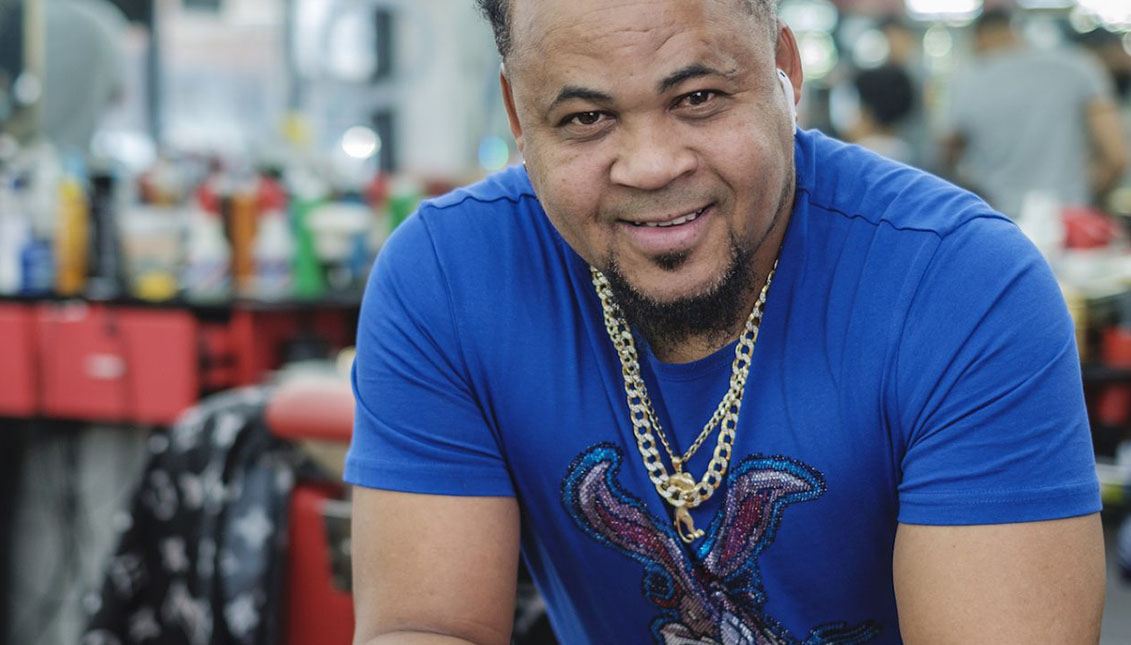
How a Dominican musician became the "sabrosura" barber in Philly
Raymon Rincón landed more than 10 years ago to play the güira at a concert and ended up holding a pair of scissors at La Salsa and La Salsa II.
When you walk past La Salsa barbershop on North Fifth Street, you can't help but hear a roar of laughter and Caribbean music coming from inside. It could be Latin dancehall — the bright colors of its marquee invite you to think so — but through the window you can make out the barber's chairs and the bundles of hair being swept off the floor by the 15 employees working inside.
La Salsa is one of nearly 12,000 Latino businesses in the city and a meeting place for Philadelphia's huge Dominican community, which is the second largest group of Latinos after Puerto Ricans.
A group that has made its way in the United States by creating businesses - immigrants are twice as entrepreneurial as native-born Americans, according to the Ewing Marion Kauffman Foundation.
Raymon Rincón, owner of La Salsa and La Salsa II, just a few blocks down the street from North Fifth, is one of them.
But Rincón never imagined he would settle in the country and trade music for scissors and stages for the hair of his countrymen. But, as Marc Anthony sang, the musician lived in the moment to understand destiny.
And it was a very cold time, shall we say. Christmas Eve 1997.
That Christmas, Raymon, who preferred the winters of the Dominican Republic, had traveled to the United States as a player of the güira, a percussion instrument. He was traveling with William Segura and the Vacandú, a bachata group, and the tour took them to Manhattan, Europe, Puerto Rico, Miami and finally back to New York.
But upon arriving in Philadelphia, Raymon was struck by how musical the city was and ended up moving. "It felt like a neighborhood that belonged to us," he told WHYY. "Philadelphia had parking, more activity, less hustle and bustle."
At first, Rincón combined his work as a musician with gardening and spent his free time at a friend's barbershop, in between jokes and stories. But when he lost his job, he said to his friend, "Give me that chair," and started cutting hair.
After a while, with the help of friends, Raymon Rincón opened his own business, La Salsa, and began to give work to other colleagues who eventually went on to open their own businesses.
"The Dominican comes with a desire to progress," said Rincón. "The barbershops are Dominican, the beauty salons for women, the bodegas — the businesses for sending things and sending money — almost all of them are Dominican."
RELATED CONTENT
La Salsa is mostly Dominicans, but also Latinos and African-Americans called in by Raymon's great expertise with the scissors ; they don't need to say much to the barber who already knows how they're going to want their haircut before they even sit on the chair.
"This is a five-star barbershop," boasts Rincón. "You can tell we are number one."
His clients are also friends and part of a community that always lends a helping hand to anyone who needs it.
"Sure, if you're a person who... even if you don't have papers and you don't have a social security card, there are friends who have pursued and have businesses and want other friends [to move forward]... to help others. Like me, I've helped many, many people," says Raymon Rincón.
Although La Salsa is basically a barbershop and its atmosphere is masculine, many women bring their sons and nephews to have their hair cut by Rincón and his employees, and the Caribbean native boasts that everyone is treated with the utmost respect. And given the festive and cheerful nature of the place, it's not surprising that there are romances.... But they culminate outside the shop.
"I'm not saying that no one can fall in love, because everyone can fall in love, but there is respect here," says Rincón.
The work is hard and hectic at La Salsa. Getting up early, arriving early, serving customers with a smile and making them happy is the daily bread. But it is also a vocation.
And although he loves his business, Raymon Rincón still dreams of touring the world. The hair gets cut, the looks change, but the music is lived from the roots of the hair.











LEAVE A COMMENT: